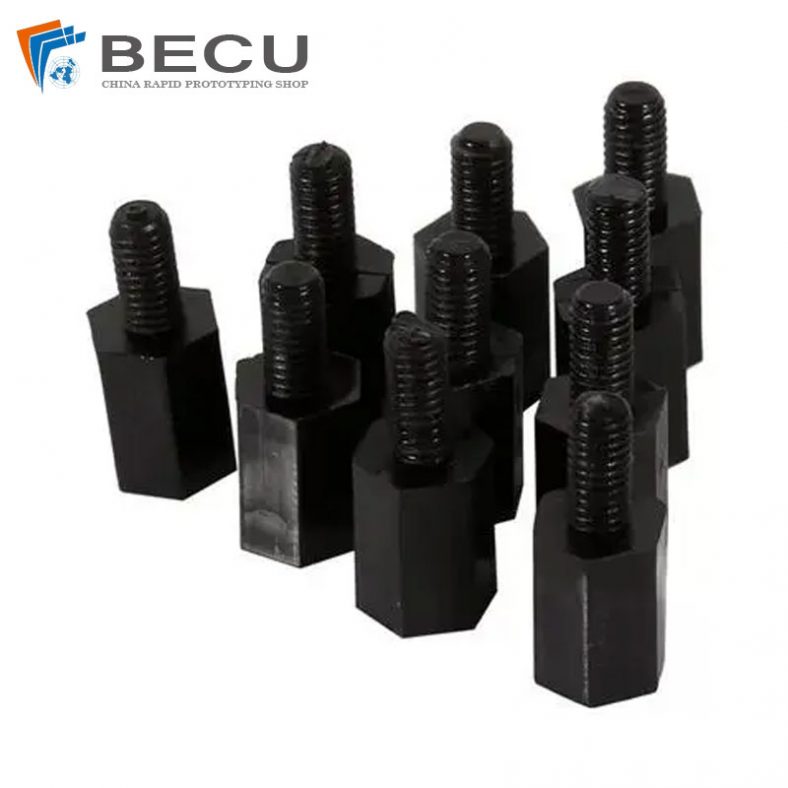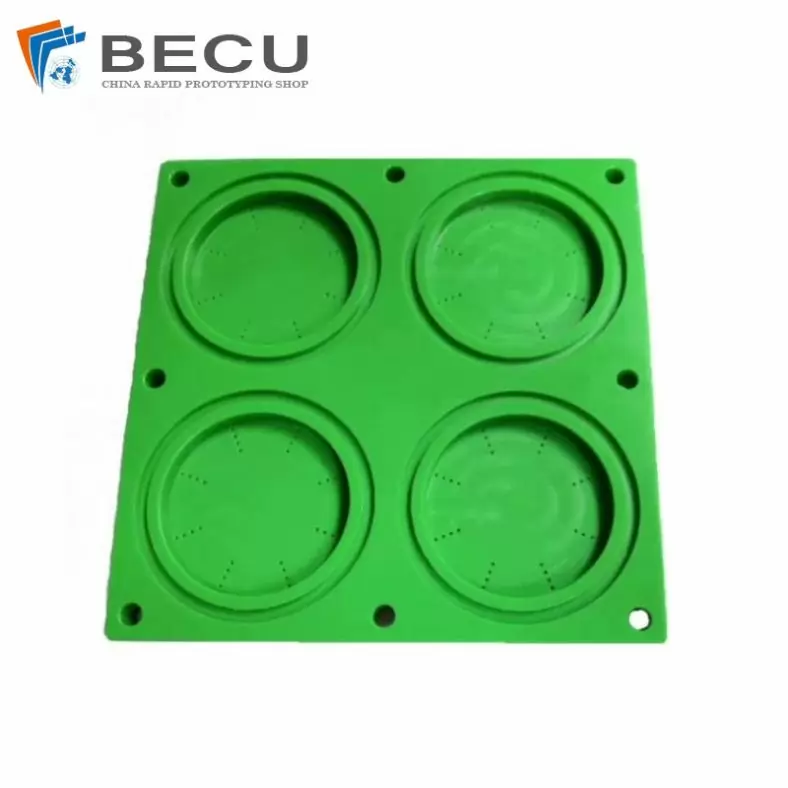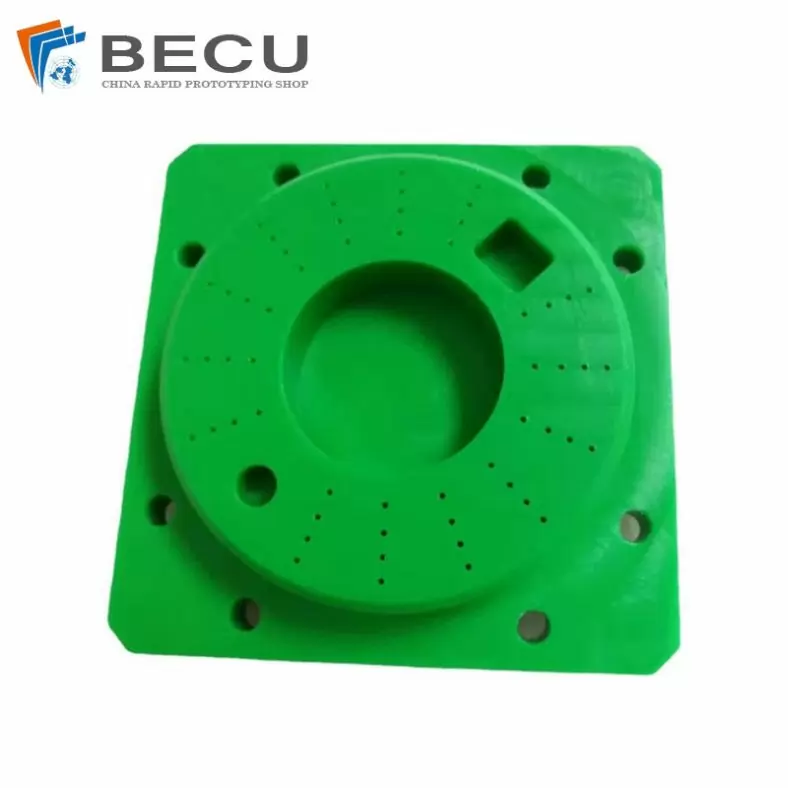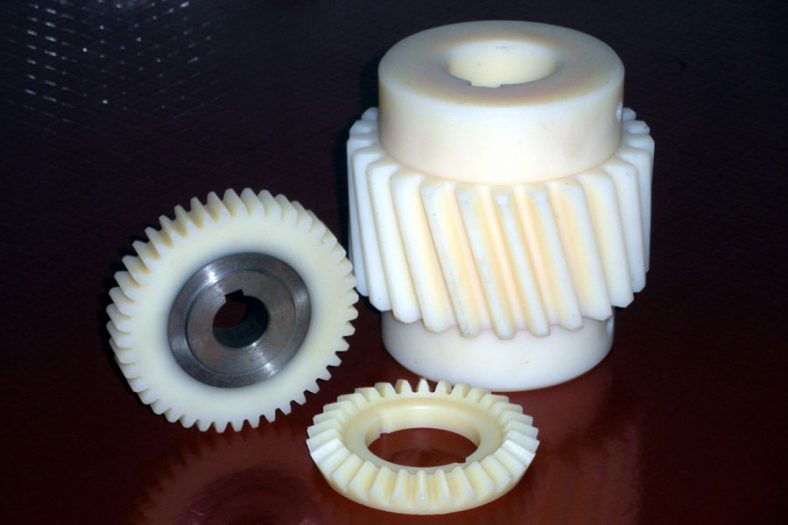
CNC machining of nylon refers to the process of using Computer Numerical Control (CNC) technology to fabricate parts and components from nylon material.
CNC machining is a subtractive manufacturing method that involves removing material from a solid block of nylon to create the desired shape and features.
Nylon is a versatile and widely used thermoplastic material known for its strength, durability, low friction coefficient, and chemical resistance. It’s commonly used in various industries, including automotive, aerospace, electronics, medical, and consumer goods.
Machining Nylon Service – CNC Machining Polyamide Parts
As a leading expert in Nylon Machining, Be-Cu prototype has consistently strived to push the boundaries of manufacturing excellence. Our extensive experience in working with advanced materials, coupled with cutting-edge machining technologies, has positioned us at the forefront of the industry. Nylon, with its remarkable combination of durability, chemical resistance, and ease of machining, presents a unique avenue for us to explore together.
We have closely monitored the evolving demands of the market and have identified a growing need for high-quality Nylon components across a range of applications, from automotive and aerospace to consumer electronics and medical devices. Through collaboration, we believe that we can leverage the strengths of both our organizations to address these needs effectively.Here’s a glimpse of what we bring to the table:
- Technical Expertise: Our team of skilled engineers and machinists possess an in-depth understanding of Nylon’s properties and behavior during machining. This expertise enables us to optimize machining processes for enhanced precision and efficiency.
- State-of-the-Art Facilities: [Your Company] has invested significantly in state-of-the-art machining facilities, equipped with advanced CNC machinery and computer-aided design tools. These resources empower us to deliver components with exceptional accuracy and quality.
- Customization and Prototyping: We understand that each project is unique. Our ability to rapidly prototype and customize Nylon components allows us to cater to the specific requirements of your projects, thereby ensuring a tailored solution.
- Quality Assurance: Quality is at the core of everything we do. Our rigorous quality control processes ensure that every component leaving our facility meets the highest industry standards.
We are excited about the prospect of collaborating with our client to explore the vast potential that Nylon machining holds. By pooling our expertise, resources, and dedication to innovation, we believe that we can not only meet but exceed the expectations of our clients and contribute to advancements in various industries.
I would welcome the opportunity to further discuss the details of this collaboration and how we can align our capabilities for mutual benefit. Please let me know a suitable time for a call or meeting at your convenience. Feel free to reach out to me via email at [email protected].
Thank you for considering this partnership. We look forward to the possibility of working together to shape the future of Nylon machining.
Nylon Machining Properties
The table below displays an overview of the material properties, units and values for Machining Nylon.
| Property | Value | Unit |
|---|---|---|
| Density | 1.13 – 1.15 | g/cm³ |
| Tensile Strength | 55 – 85 | MPa |
| Modulus of Elasticity | 1,500 – 3,500 | MPa |
| Elongation at Break | 20 – 300 | % |
| Hardness (Rockwell) | R75 – R125 | – |
| Melting Point | 160 – 220 | °C |
| Heat Deflection Temp. | 60 – 120 | °C |
| Coefficient of Friction | 0.25 – 0.35 | – |
| Water Absorption (24 hrs) | 1.5 – 7.0 | % |
| Chemical Resistance | Resistant to many chemicals | – |
| Machinability | Excellent | – |
| Thermal Conductivity | 0.25 – 0.45 | W/(m·K) |
| Electrical Insulation | Good | – |
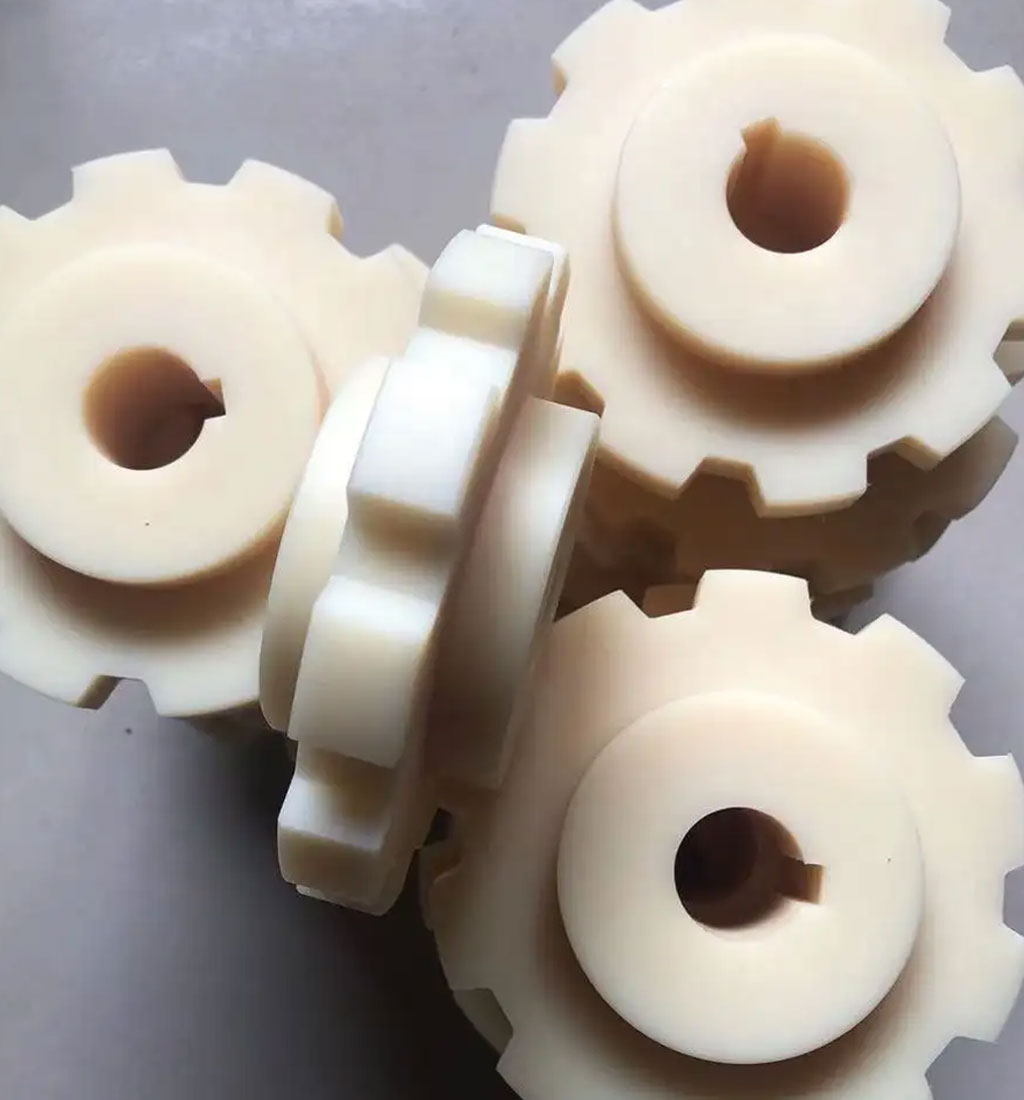
Do you have specific Nylon cnc machining requirements? Feel free to get in touch with our Nylon machining experts to discuss the use of Nylon plastic to machine your parts for industrial applications. Our experts will respond to you at the earliest.
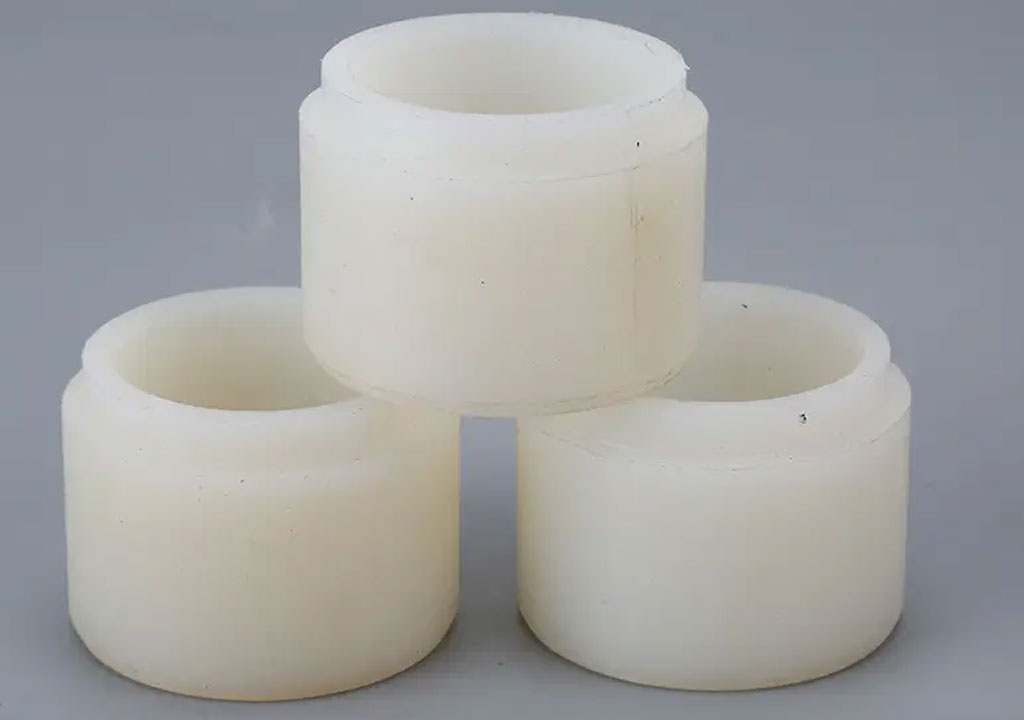
Glass Filled Nylon Machining
Glass-filled nylon, also known as glass-reinforced nylon, is a composite material that combines nylon with glass fibers to enhance its mechanical and thermal properties. Machining glass-filled nylon presents specific challenges and considerations due to the presence of glass fibers, which can affect tool wear, surface finish, and overall machining process.
Machining glass-filled nylon requires careful consideration of tooling, cutting parameters, cooling/lubrication, and tool path strategies to achieve optimal results. It’s important to adapt your machining approach based on the specific composition of the glass-filled nylon and the desired end-product specifications.
Machinable Nylon – Nylon Blocks For Machining
Machinable nylon, often referred to as engineering nylon or CNC-machinable nylon, is a type of thermoplastic material that is specifically designed to be easily machined using various machining processes, including Computer Numerical Control (CNC) machining. It combines the desirable properties of nylon with enhanced machinability, making it a preferred choice for industries that require precise and intricate components.
When machining machinable nylon, it’s important to consider factors such as tool selection, cutting parameters, cooling/lubrication, and tool path strategies to optimize the machining process. Machinable nylon offers a balance between the advantageous properties of nylon and improved machinability, making it a versatile material for producing precision components through machining processes like CNC milling, turning, and drilling. It is favored for applications where high-quality parts with tight tolerances and intricate geometries are required.
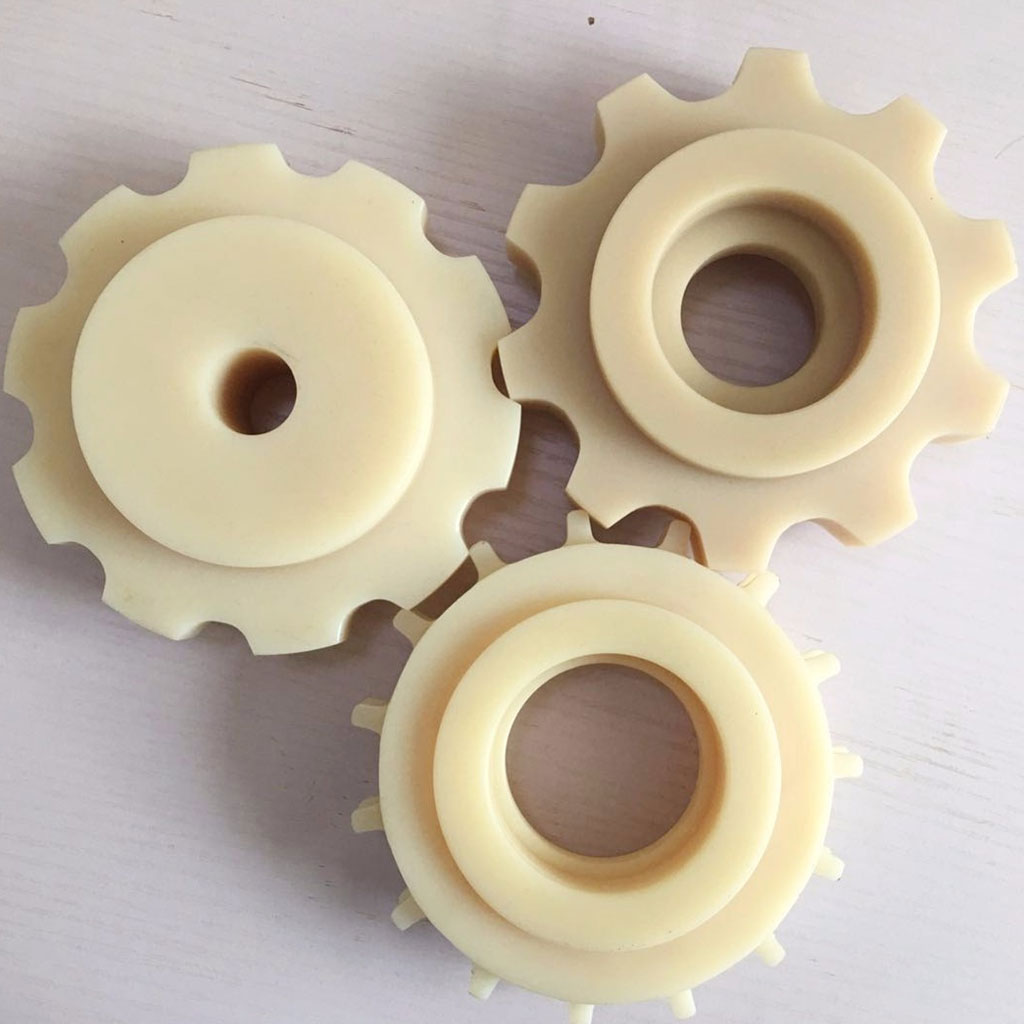
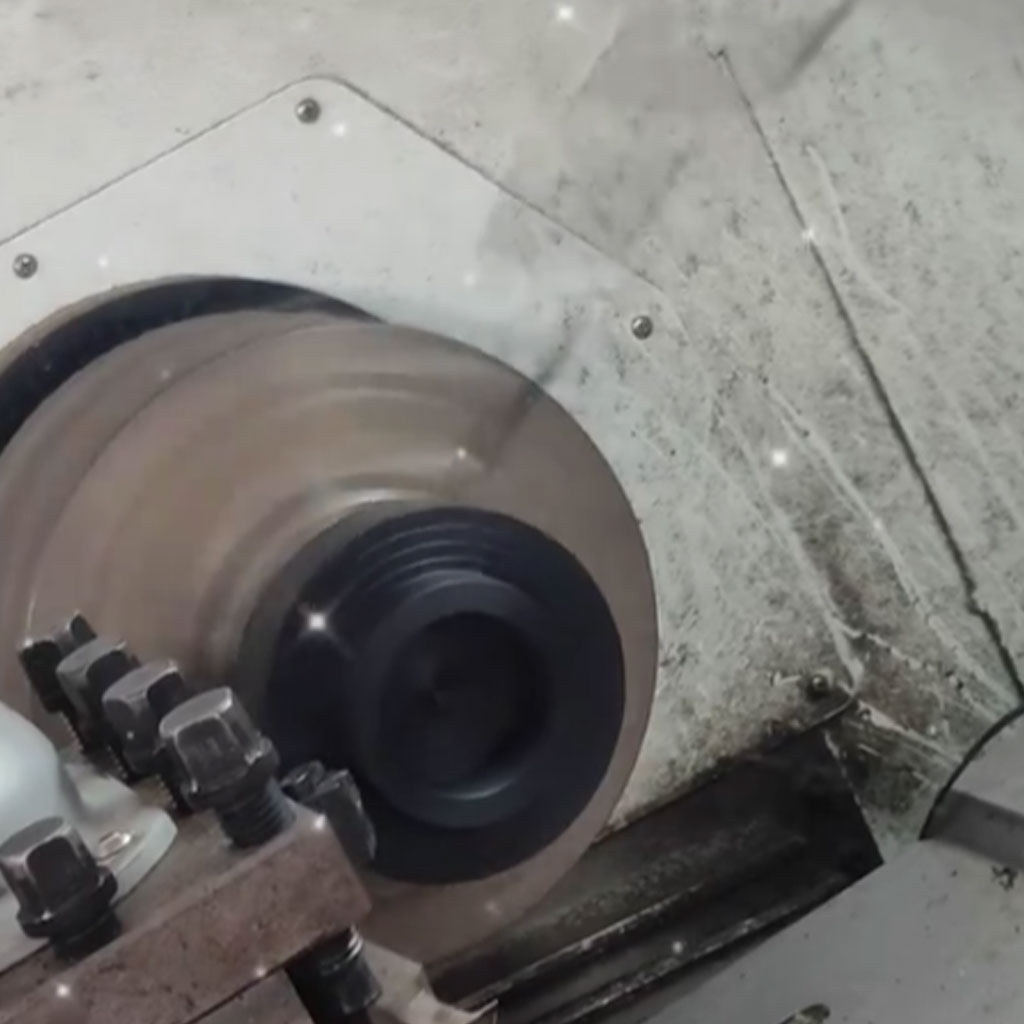
How To Ensure Nylon Plastic Machining Accuracy?
Through a scientific/rigorous method and a non-impetuous mind
- The team members have 35 years of experience in plastic machining more than 100,000 precision products.
- Constant temperature cnc machining environment ●5-axis ultra-precision machining equipment, achieving 0.1μ resolution, 1μ cutting ●Equipped with ultra-high-precision Renishaw probe (on-line detection and compensation of parts during cnc plastic machining, so that the results can be seen before leaving the machine)
- Cooperate with global engineering plastics material suppliers to ensure the quality of raw materials
- ISO standardized management and evolving precision machining technology for special engineering plastics
- What can really achieve ultra-high precision for complex engineering plastic products is:
- Persistence in mission, love for the industry and not impetuous heart
Why Choose Our Nylon Cnc Machining Service?
- Save time and money for your nylon project but quality guaranteed.
- High productivity, outstanding efficiency and high accuracy
- A wide range of nylon grades and plastic materials can be machined
- Custom complex nylon machined parts and components at specific tolerances
- High speed machining for prototyping and low to high volume production runs
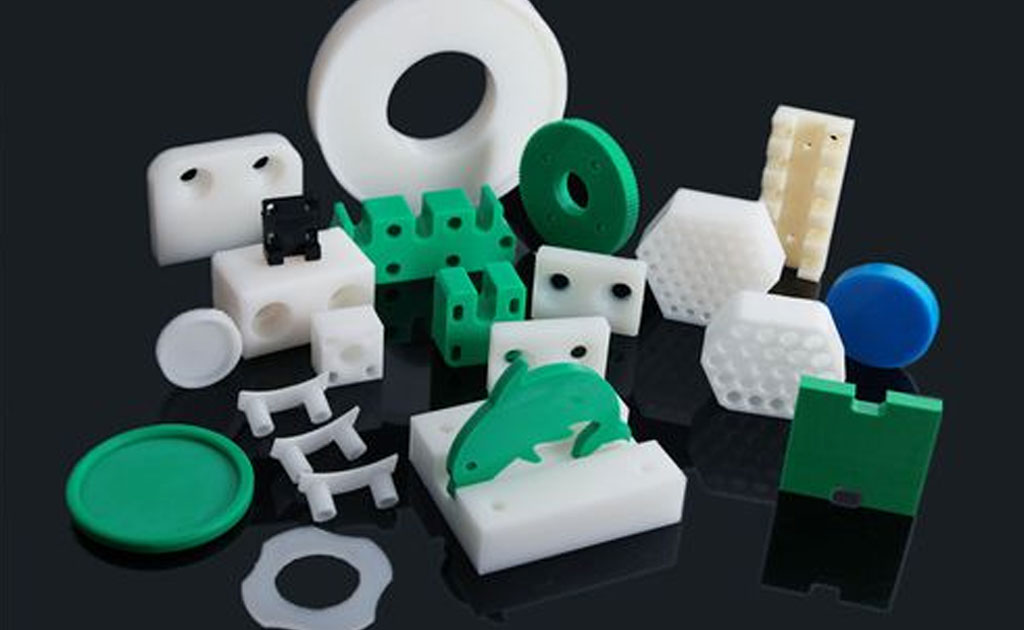
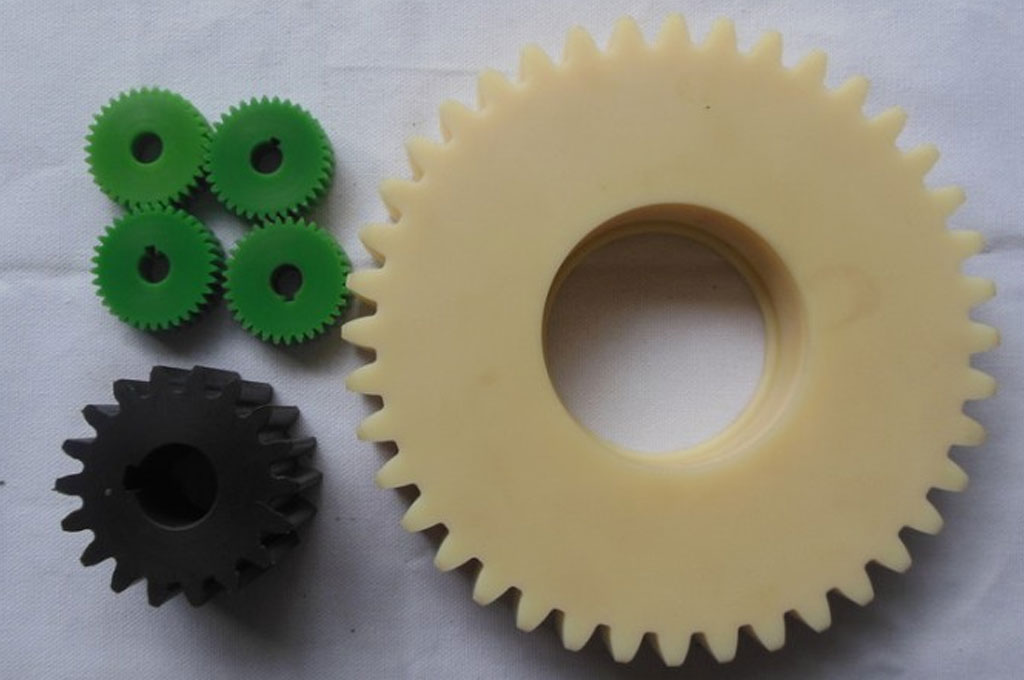
Certifications & Quality Machining
- ISO 9001:2015 certified
- Fully compliant with the exacting requirements of our customers
- Compliance in DFARS materials sourcing requirements
- Strict compliance with PPAP and Process
- FMEA for automotive customers
- Skilled in KanBan and CMM Inspection and inventory management systems
- ITAF 16949 certified
Top Nylon Cnc Machining Case Studies
Cnc Machining processes such as cnc milling, turning and swiss machining are today considered the most economic way to make nylon prototypes.Our company has rich experience making nylon concept models and precise functional components. Understanding the properties of different nylon plastic, with lots of testing and experimentation with pre-heating, tool paths and other factors, we are able to minimize deformation on nylon. Be-cu prototyping company provides a range of solutions for the machining of nylon plastic parts.
Machining Nylon 66 And Precautions
Machining nylon 66, a type of polyamide, requires specific considerations due to its material properties. Nylon 66 is known for its strength, toughness, chemical resistance, and durability, which make it suitable for various applications. Here’s a guide to machining nylon 66:
- Tool Selection: Choose cutting tools made of high-speed steel (HSS) or carbide. Carbide tools are preferred for their durability and resistance to wear. Tools with sharp edges and positive rake angles are ideal for efficient machining.
- Cutting Speed: Nylon 66 has a relatively low melting point, so moderate cutting speeds are recommended to prevent excessive heat buildup. Higher speeds could lead to material melting or smearing on the workpiece surface.
- Feed Rate: Use a moderate feed rate to avoid putting too much stress on the material, which could result in chip buildup, melting, or poor surface finish.
- Depth of Cut: Nylon 66 is relatively soft, so a shallow depth of cut is recommended. Deeper cuts might cause vibration, poor surface finish, or even tool breakage.
- Coolants and Lubricants: Apply coolants or lubricants during machining to dissipate heat and minimize friction. This helps prevent melting and improves the overall quality of the machining process.
- Chip Control: Nylon 66 can produce stringy chips that can wrap around the tool. Adequate chip evacuation is essential to prevent tool damage and ensure consistent machining.
- Tool Path Strategy: Use appropriate tool paths to prevent continuous contact with the same area, which can lead to localized heat buildup. Strategies like trochoidal milling can be effective for nylon 66.
- Surface Finish: Nylon 66 has a tendency to produce rough surfaces after machining. Post-machining processes like sanding or polishing might be required to achieve the desired surface quality.
- Adhesive Tendencies: Nylon 66 can have a tendency to adhere to cutting tools due to its low melting point. Proper cooling and lubrication help prevent this issue.
- Clamping and Workholding: Ensure that the workpiece is securely clamped to prevent vibration and movement during machining, which can result in inaccuracies.
- Tool Inspection: Regularly inspect cutting tools for wear and damage. Dull tools can lead to poor surface finish, increased cutting forces, and potential damage to the material.
- Dust Collection: Proper dust collection systems are important to manage the fine particles that nylon 66 machining can produce. This promotes a clean and safe working environment.
Remember that specific machining parameters can vary based on the machine, tooling, and part geometry. It’s essential to test and adjust the parameters on scrap material or test pieces before machining the final component. Additionally, consulting with material suppliers, tooling manufacturers, or machining experts can provide valuable insights tailored to your specific application.

